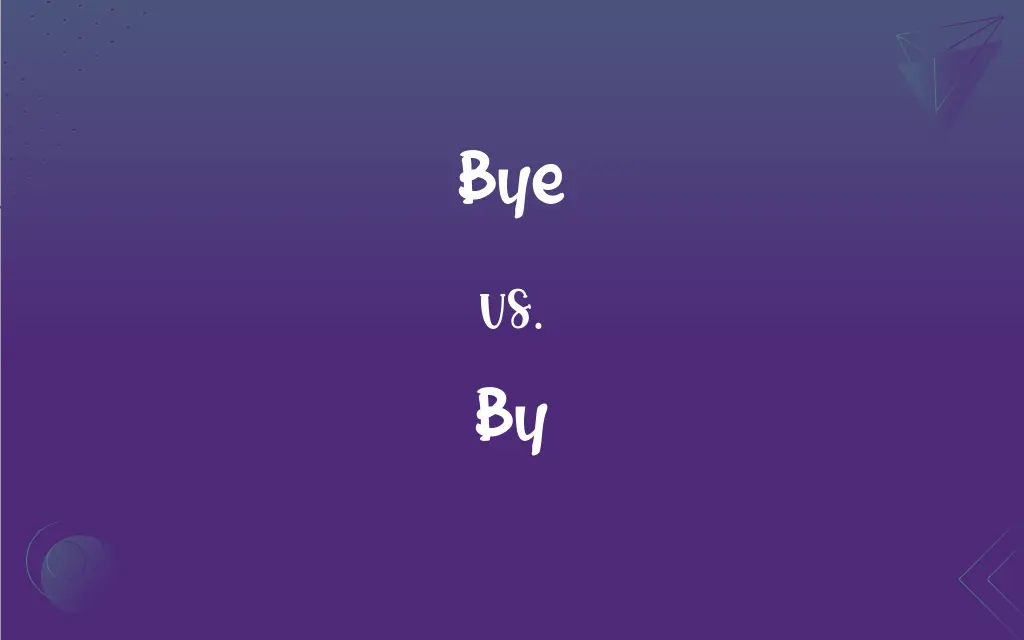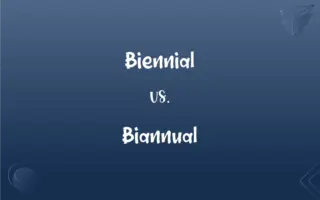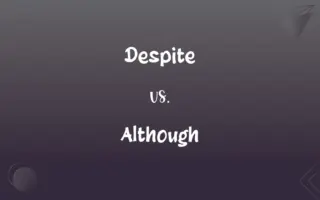Bye vs. By: What's the Difference?
Edited by Aimie Carlson || By Harlon Moss || Updated on November 15, 2023
Bye means a farewell; by is a preposition indicating location or means.

Key Differences
"Bye" is a term we often use to bid someone farewell. When we are leaving a place or ending a conversation, "bye" is a common word to signal that departure. On the other hand, "by" is a versatile preposition. It can refer to the author of a book, the means by which something is done, or the location of an object next to another. For instance, "The book is by Mark Twain" indicates the author, whereas "I traveled by train" speaks to the mode of transport.
In another context, "bye" can also refer to a situation in sports where a team or individual is allowed to advance to the next round without playing. For instance, in a tournament, a top-seeded player might receive a "bye" due to their high ranking. Comparatively, "by" can indicate the extent of a margin. For example, "She won the race by two seconds" means that the difference between the winner and the next competitor was two seconds.
"Bye" can sometimes be spelled as "by" in specific contexts, such as in the phrase "stand by." However, this is the exception and not the rule. Conversely, "by" is used in passive voice constructions to indicate the doer of an action. For example, "The letter was written by John" showcases John as the author of the letter.
Another difference is their origins. "Bye" comes from the phrase "goodbye," which originally meant "God be with you." Over time, it shortened to the more colloquial "bye." "By," on the other hand, has Old English origins and has retained its meaning as a preposition over centuries.
Comparison Chart
Part of Speech
Interjection
Preposition
ADVERTISEMENT
Meaning
A farewell
Indicating location, means, or agent
Example
Bye, see you tomorrow!
The book is by Mark Twain.
Usage in Sports
Refers to a pass to the next round without playing
-
Origin
Shortened from "goodbye"
Old English
Bye and By Definitions
Bye
A side issue or secondary matter.
Let's put that concern to the bye for now.
ADVERTISEMENT
By
Indicating the agent in passive voice.
The song was sung by her.
Bye
Farewell greeting.
Bye, I'll see you soon.
By
Referring to the means of doing something.
They came by car.
Bye
Part of "goodbye".
She whispered a soft bye before leaving.
By
Describing proximity or location.
The house by the lake.
Bye
A deviation from the main topic.
Without further bye, let's get to the main point.
By
Indicating the author or creator.
A novel by Stephen King.
Bye
An automatic advancement in sports.
The top team got a bye into the finals.
By
Indicating the amount or margin.
He won by a landslide.
Bye
A secondary matter; a side issue.
By
Close to; next to
The window by the door.
Bye
(Sports) The position of one who draws no opponent for a round in a tournament and so advances to the next round.
By
With the use or help of; through
We came by the back road.
Bye
Used to express farewell.
By
Up to and beyond; past
We drove by the house.
FAQs
Can "bye" be used in sports terminology?
Yes, it refers to a pass to the next round without playing.
What part of speech is "by"?
"By" is a preposition.
Is "bye" derived from another word?
Yes, "bye" is derived from "goodbye."
Does "by" only indicate location?
No, "by" is versatile, indicating location, means, agent, and more.
How is "bye" different from "goodbye"?
"Bye" is a more informal and shorter version of "goodbye."
How is "by" used in passive voice?
To indicate the doer of an action, as in "The book was written by her."
Can "bye" be spelled as "by"?
In certain contexts, like "stand by," but it's rare.
Can "bye" be used in formal writings?
Generally, "goodbye" is preferred in formal contexts over "bye."
Is "bye" a modern word?
It's a shortened form of "goodbye," which has older origins.
Can "by" indicate the method of something?
Yes, like in "Travel by train."
What does "bye" generally mean?
"Bye" is typically used as a farewell greeting.
What's the origin of "by"?
It has Old English origins.
Is "bye" formal or informal?
"Bye" is generally considered informal.
Can "bye" mean something other than farewell?
Yes, it can refer to a deviation from the main topic or a secondary matter.
Does "by" always indicate proximity?
No, it can also indicate means, agent, or margin.
Can "by" indicate authorship?
Yes, like in "The play is by Shakespeare."
In what context might "by" be used in sports?
Typically, it's not used in a sports context like "bye."
Can "by" indicate a margin or extent?
Yes, like "She won by three points."
Does "by" always come before a noun or pronoun?
Most commonly, yes, as it's a preposition.
Can "bye" and "by" be used interchangeably?
No, they have distinct meanings and usages.
About Author
Written by
Harlon MossHarlon is a seasoned quality moderator and accomplished content writer for Difference Wiki. An alumnus of the prestigious University of California, he earned his degree in Computer Science. Leveraging his academic background, Harlon brings a meticulous and informed perspective to his work, ensuring content accuracy and excellence.
Edited by
Aimie CarlsonAimie Carlson, holding a master's degree in English literature, is a fervent English language enthusiast. She lends her writing talents to Difference Wiki, a prominent website that specializes in comparisons, offering readers insightful analyses that both captivate and inform.






































































